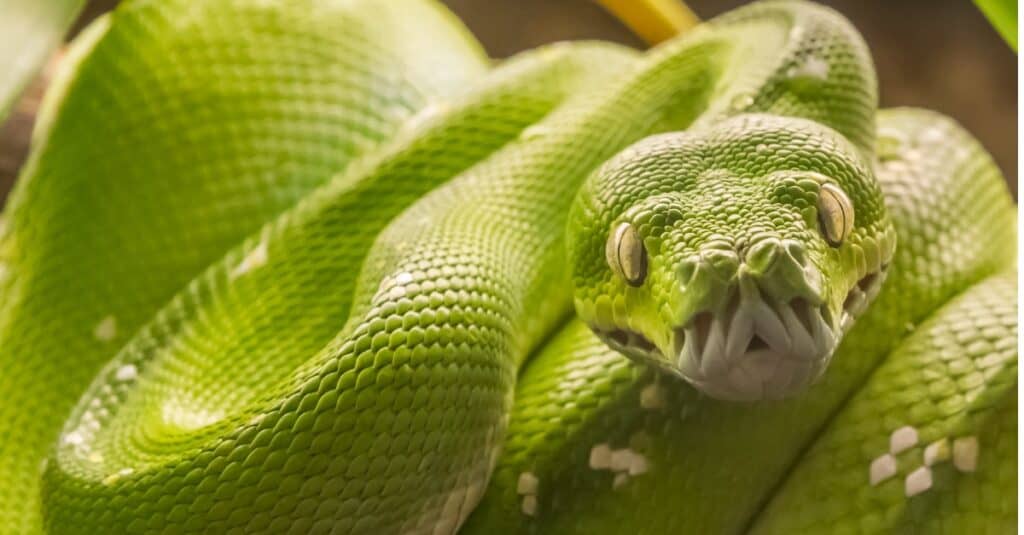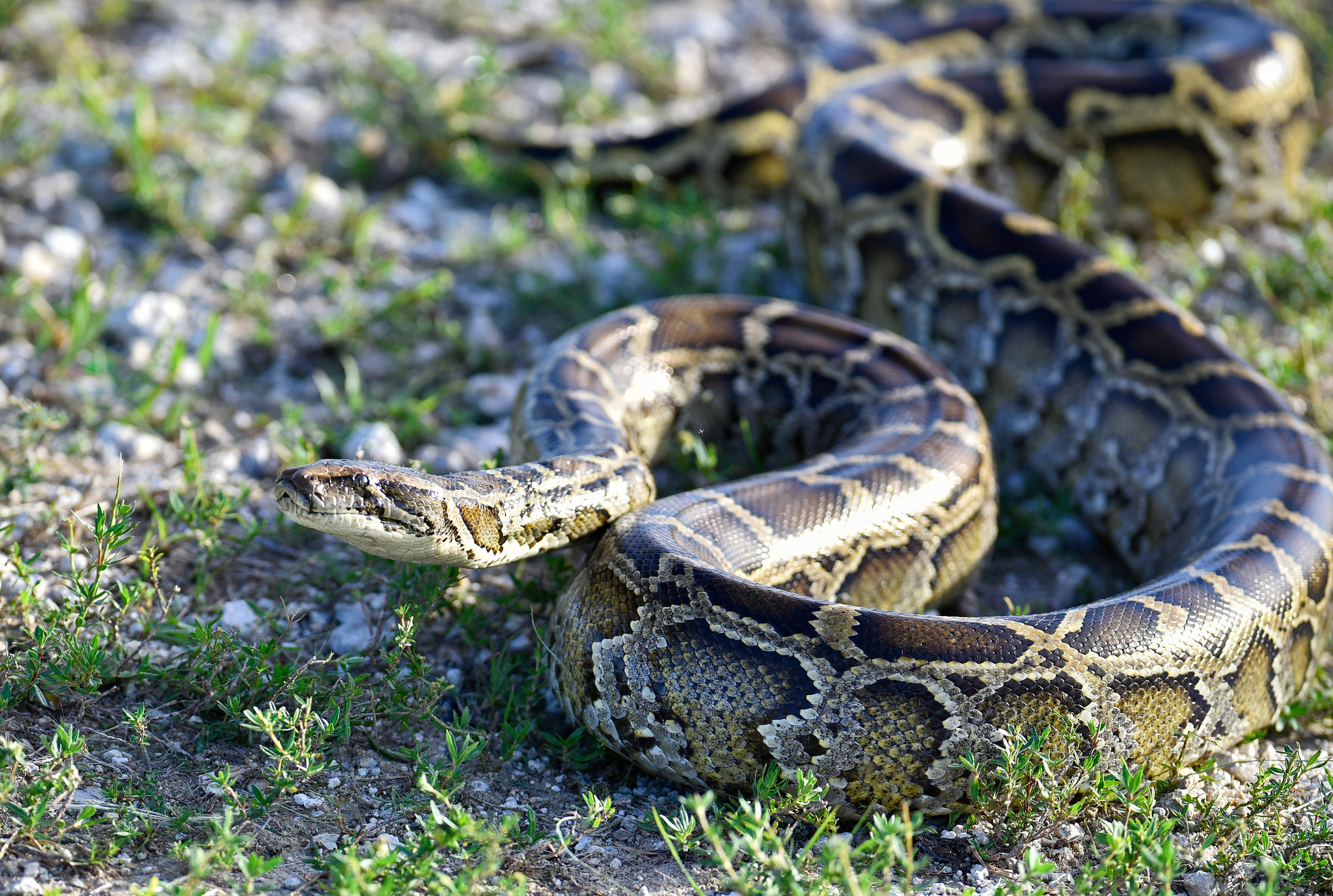Are Pythons Venomous? Debunking The Myth And Unveiling The Truth
Here's the deal—when you hear the word "python," what comes to mind? A massive snake that can swallow a deer whole or a sneaky venomous reptile ready to strike? Well, let's dive straight into this and clear the air because pythons are more fascinating than you might think. Whether you're a wildlife enthusiast or just curious about these slithering creatures, understanding whether pythons are venomous is crucial. So, let's unravel the mystery together.
Pythons have always sparked curiosity and fear among humans. Their sheer size and strength often lead people to believe they're dangerous predators with venomous capabilities. But is that really true? Spoiler alert: pythons aren't venomous, but there's so much more to learn about them. From their hunting techniques to their role in the ecosystem, pythons are incredible animals that deserve our respect and understanding.
Before we dive deep into the world of pythons, let's clarify why this topic matters. If you're planning a trip to the jungle or simply want to know more about these magnificent creatures, it's essential to separate fact from fiction. Pythons play a vital role in maintaining balance in nature, and knowing whether they're venomous or not can help you appreciate them even more. So, let's get started!
Read also:Jules Ari Leaked The Untold Story And What You Need To Know
Understanding Pythons: The Basics
First things first, let's break down what pythons actually are. Pythons belong to the Pythonidae family, which includes some of the largest snakes in the world. They're non-venomous constrictors, meaning they don't rely on venom to hunt. Instead, they use their powerful muscles to squeeze their prey until it suffocates. This method is both efficient and fascinating, showcasing the python's incredible strength and adaptability.
Pythons are found in various parts of the world, including Africa, Asia, and Australia. They thrive in diverse habitats, from rainforests to grasslands, and even urban areas. Their ability to adapt to different environments makes them one of the most successful snake species on the planet. But don't worry—they're not out to get you! Pythons are generally shy creatures that prefer to avoid human contact whenever possible.
Are Pythons Venomous or Not?
Let's address the million-dollar question: are pythons venomous? The short answer is no, pythons are not venomous. Unlike vipers or cobras, pythons lack venom glands and fangs designed for injecting venom. Instead, they rely on their brute strength to subdue prey. This makes them unique among snakes and highlights their evolutionary path as constrictors rather than venomous predators.
However, it's worth noting that some pythons have small amounts of rear-fang venom. This isn't used for hunting but may serve as a defense mechanism against threats. The venom is so weak that it poses no real danger to humans or large animals. So, while pythons aren't venomous in the traditional sense, they do have a few tricks up their scales.
Python's Hunting Techniques: How They Survive Without Venom
Since pythons don't rely on venom, you might wonder how they manage to hunt effectively. The answer lies in their incredible constricting abilities. When a python spots its prey, it strikes quickly, wrapping its body around the animal and squeezing tightly. This pressure cuts off blood flow to the brain, causing the prey to lose consciousness and eventually die. It's a slow but effective method that ensures the python gets its meal without needing venom.
Here are some key points about python hunting techniques:
Read also:Is Ron Jeremy Still Alive Unveiling The Truth Behind The Iconic Porn Legend
- Pythons use heat-sensing pits to detect warm-blooded prey.
- They can swallow prey much larger than their own heads.
- After a big meal, a python can go weeks or even months without eating again.
This unique approach to hunting showcases the python's intelligence and adaptability. By relying on physical strength rather than venom, pythons have carved out a niche in the animal kingdom that few other species can match.
The Role of Pythons in the Ecosystem
Pythons play a crucial role in maintaining the balance of ecosystems around the world. As apex predators, they help control populations of rodents and other small mammals. Without pythons, these populations could grow out of control, leading to agricultural damage and the spread of diseases. In this way, pythons serve as nature's pest control agents, keeping ecosystems healthy and thriving.
However, pythons can also become invasive species in certain areas. For example, the Burmese python has taken over parts of Florida's Everglades, where it preys on native wildlife and disrupts the local ecosystem. This highlights the importance of understanding and managing python populations to prevent ecological imbalances.
Types of Pythons: A Closer Look
Not all pythons are created equal. There are several species of pythons, each with its own unique characteristics and habitats. Here are a few of the most well-known python species:
- Burmese Python: Native to Southeast Asia, this massive snake can grow up to 23 feet long and weigh over 200 pounds.
- Ball Python: A smaller species found in Africa, ball pythons are popular pets due to their docile nature and manageable size.
- Reticulated Python: The longest snake in the world, reticulated pythons can exceed 30 feet in length and are native to Southeast Asia.
Each species has its own hunting habits, preferred prey, and ecological role. By studying these differences, we can gain a deeper understanding of pythons and their importance in the animal kingdom.
Are Pythons Dangerous to Humans?
Now that we've established that pythons aren't venomous, you might still be wondering if they're dangerous to humans. The truth is, pythons rarely pose a threat to people. Most species prefer to avoid human contact and will only attack if they feel threatened or cornered. Even then, attacks on humans are extremely rare and usually involve smaller individuals or pets.
However, there have been a few documented cases of large pythons attacking humans, particularly in areas where humans and snakes coexist closely. These incidents are tragic but remind us of the importance of respecting wildlife and understanding their behavior. By keeping a safe distance and avoiding interactions, we can coexist peacefully with these incredible creatures.
Python Conservation: Protecting These Incredible Creatures
Despite their fearsome reputation, pythons face numerous threats in the wild. Habitat loss, illegal wildlife trade, and climate change are just a few of the challenges they must overcome. Conservation efforts are crucial to ensuring the survival of these magnificent snakes for future generations.
Organizations around the world are working tirelessly to protect pythons and their habitats. From creating protected areas to educating local communities about the importance of pythons, these efforts are making a real difference. By supporting conservation initiatives, we can help ensure that pythons continue to thrive in the wild.
Fun Facts About Pythons
Before we wrap up, let's take a moment to appreciate some fun facts about pythons:
- Pythons can live for over 20 years in the wild.
- Female pythons often wrap their bodies around their eggs to keep them warm during incubation.
- Some pythons can climb trees and swim in water, making them incredibly versatile hunters.
These facts highlight the incredible diversity and adaptability of pythons, making them one of the most fascinating snake species on the planet.
Conclusion: Are Pythons Venomous?
To sum it all up, pythons are not venomous. They rely on their strength and constricting abilities to hunt, making them unique among snakes. By understanding their behavior, habitat, and ecological role, we can appreciate these incredible creatures and work to protect them for future generations.
So, the next time someone asks you if pythons are venomous, you'll know exactly what to say. Share this article with your friends and family to spread awareness about these amazing snakes. And if you're ever lucky enough to encounter a python in the wild, remember to keep your distance and respect its space. After all, these gentle giants deserve our admiration and protection.
Thanks for reading, and don't forget to leave a comment or share your thoughts below. If you enjoyed this article, be sure to check out our other posts on wildlife and conservation. Until next time, stay curious and keep exploring!
Table of Contents
- Are Pythons Venomous? Debunking the Myth and Unveiling the Truth
- Understanding Pythons: The Basics
- Are Pythons Venomous or Not?
- Python's Hunting Techniques: How They Survive Without Venom
- The Role of Pythons in the Ecosystem
- Types of Pythons: A Closer Look
- Are Pythons Dangerous to Humans?
- Python Conservation: Protecting These Incredible Creatures
- Fun Facts About Pythons
- Conclusion: Are Pythons Venomous?



